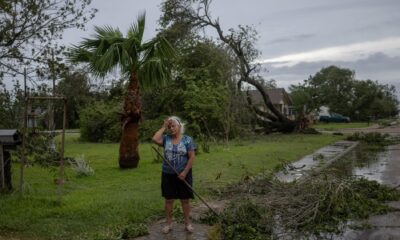Since the COVID-19 pandemic started, many provinces have been forced to close schools and push their students into online learning. As coronavirus cases continue to soar, Ontario became the latest province to announce they would again move from in-person learning to remote schooling.
And online learning could be a part of a permanent solution in Ontario, according to a document first published in the Globe and Mail. This has some experts concerned about the harmful long-term effects online learning may have on students.
READ MORE: How a lack of socialization amid COVID-19 could impact a generation of kids
Lana Parker, an assistant professor at the Faculty of Education at the University of Windsor, said she does not believe online can replace in-person learning, arguing that schools offer a complex, relationship-oriented learning and social environment.
“We’ve been witness to what’s been happening with online schooling in an emergency context for the last year. And certainly, I think our teachers have done exceptionally well to pivot to online school and offer students the best interactive environment that they can. But we’ve also seen that there are many shortcomings and harms with this continued online situation for students.”
Last month, the report from the Globe and Mail said the Ontario government is allegedly looking at the option of making remote learning a permanent part of the public school system. The proposal said it is not a mandate but a choice for families.
“If introduced and passed, beginning in September 2021, parents would continue to have the ability to enroll their child in full-time synchronous remote learning if they choose going forward,” the document in the Global and Mail stated.
According to the province, they are continuing consultations on the topic, but believe families should have a choice of online learning this coming September, as there is no telling when this coronavirus pandemic will end.


“The choice parents were provided for online or in-class learning has been absolutely critical in ensuring students’ continuity of learning throughout the pandemic and in mitigating learning loss,” Caitlin Clark, a spokesperson for Ontario Education Minister Stephen Lecce, said.
“One of Ontario’s unique strengths during the past year was that we built-up the online learning capacity ahead of and during the pandemic, against the strong opposition of teachers’ unions, because we believe students should continue to learn, regardless of the circumstances, from snow days to global pandemics. ”
Virtual learning was first implemented in response to climbing COVID-19 numbers in an effort to curb the spread of the virus and keep staff and students safe amid the pandemic. Schools have been closed to in-person learning several times since the onset of the pandemic in March 2020, and not just in Ontario, but in most provinces.
So what are the risks and benefits involved in making online learning a permanent education tool?
‘Kids learn best in person’
Karen Brown, first vice-president with the Elementary Teachers’ Federation of Ontario (ETFO) said online learning was never meant to be a permanent solution, it was only a temporary response to the pandemic.
She argued that students are not thriving online, as they don’t have the same engagement that in-person education offers.
Read more:
Ontario could make remote learning a permanent part of school
“There are health and safety concerns with online learning, like increased screen time and privacy issues,” Brown argued. “And school is an opportunity to connect with peers and engage. Peer motivation helps students learn.”
“Kids learn best in person. It levels the playing field as schools offer equitable learning that online teaching does not.”
Parker agreed, saying that learning is highly based on relationships. The teacher has to get to know the students, understand their interests, strengths and challenges, she said.
“So when you think about all of that complexity, I think that there is so much further studying needed to understand if an online environment can support that complexity,” Parker said.
She added that classroom learning happens not simply between a teacher and student, but with student socialization.


Online learning has consequences for mental health, with increased feelings of social isolation, Parker stated in an article she wrote for The Conversation. Research shows that the school environment is critical for a child’s social development, and many students rely on schools for mental health care.
A July 2019 study published in ScienceDirect, found that both peer and teacher relationships are important for early adolescents’ behavioral engagement.
“Spending time with friends is often a student’s favorite part of school, and without that sense of belonging, it may be harder for kids to stay focused,” one of the authors stated.
Remote learning can also present risks for vulnerable youth, experts say.
READ MORE: ‘There’s so much pain’ — art shows mental toll COVID-19 taking on youth, expert says
“Data shows that students from marginalized and vulnerable communities are most vulnerable to these kinds of potentially bad policies,” Parker explained.
Whether it’s a family’s inability to afford extracurricular activities or a tutor, Parker said there are many unintended risks involved with remote schooling and vulnerable youth.
She explained remote learning for some students may lead to more family obligations such as more housework or taking care of a loved one with health problems.
“When you have a school system that already has issues with marginalization and systemic challenges for certain students, I don’t think the solution is to provide the student a choice ‘to not be there.’ I think the solution is to improve the education system,” she said.


Brown said public schools provide students with equitable learning and support systems like counselors, peer engagement and lunch and breakfast programs.
She’s afraid that pushing students online means some vulnerable youth will be left out, such as those in remote locations who don’t have the best internet connection or families who can’t afford printers.
“These issues remove the equalization of the school system,” she said.
Benefits to online learning
Associate professor of Social Development Studies at the University of Waterloo Kristina Llewellyn, previously told Global News that online learning fits for some families — typically for those who are able to offer support from at least one parent at home and have stable access to the internet.
Studies have shown that online learning allows more flexibility and accessibility for some families, especially for those living with disabilities.
This is one of the reasons why the Ontario government said they wanted to give families a choice of online learning in the fall. In wake of the pandemic, allowing children to have the option of remote learning, especially if they are immune-compromised, increases equitability to students.
One study published in June 2020 in Sage Journals, said online learning can offer a cheaper mode of learning in terms of lower cost of transportation and the “overall cost of institution-based learning.”
“Flexibility is another interesting aspect of online learning; a learner can schedule or plan their time for completion of courses available online,” the study showed.
Read more:
Coronavirus: Ontario parents, children dealing with stress of virtual learning
Another study published in August 2020 in JAMA Paediatrics said online learning can be a more suitable solution than attending a face-to-face school, especially when a student may experience frequent absences due to illness or a chronic health problem.
Despite the studies, Llewellyn, like other experts, said she’s concerned virtual learning could come at the detriment of classroom instruction.
“My major concern is a push to virtual learning is actually going to take away the already stretched resources that already exist to make our public schools truly equitable and accessible,” she said. “There’s a lot that’s missing about the different supports that happen within a school environment. It’s not just about content delivery, there’s a lot of therapies provided in schools, there are a lot of food programs, mental health supports.”
A source of revenue?
Parker said she worries another consequence of online learning is the potential for Ontario to divert funds from the public education system to a more private approach.
For example, according to the Globe and Mail, the province is considering whether the online courses would be operated by TVO (Ontario’s publicly funded educational television network) and TFO for French-language students.
The report further stated that TVO and TFO would put forward “a global development strategy” to market online courses and generate revenue, by enrolling out-of-province students in online courses.
“It does raise questions about whether or not this is an attempt to divert funds from public education, because the document outlines how students that attend school must pay a fee established by TVO, which is a way of diverting funds,” she said.
“We have to think about why are we trying to create a revenue stream to public education? Do we want to do that with our children’s learning?”


More time is needed
Parker and Brown said that the province seems to be rushing into making this a permanent fixture in the education system and argue that more studies and data need to be reviewed before it becomes legislation.
Brown said the ETFO was never consulted on this proposal and believes not enough “time or research” has been invested in the process to make an informed decision.
And Parker said she is still awaiting answers from the government.
“Whenever we are seeking to change policy in public education, there needs to research. There needs to be data that supports the benefits. And also there need to be investigations before introducing a policy like this as to what the potential harms might be, especially those that we might have difficulty anticipating,” she said.
— With files from Global News’ Kendra Slugoski and Jessica Patton
Must See
-




Entertainment
/ 3 days agoFaveSzn’s Revelation: Dating Choirmaster at 10 and Sexual Curiosity
Nigerian singer, Chidozie Ugochinyere, popularly known as FaveSzn, has revealed that she once dated...
By Flying Eze -






Europe
/ 3 days agoWhy Hungarian Prime Minister Orban visited
Two months later, the leaders of China and Hungary met again. Hungarian Prime Minister...
By Flying Eze -






News
/ 3 days agoThree dead and millions without power as Tropical Storm Beryl hits Texas
Man, 53, and woman, 74, killed by fallen trees and third person drowns amid...
By Flying Eze



